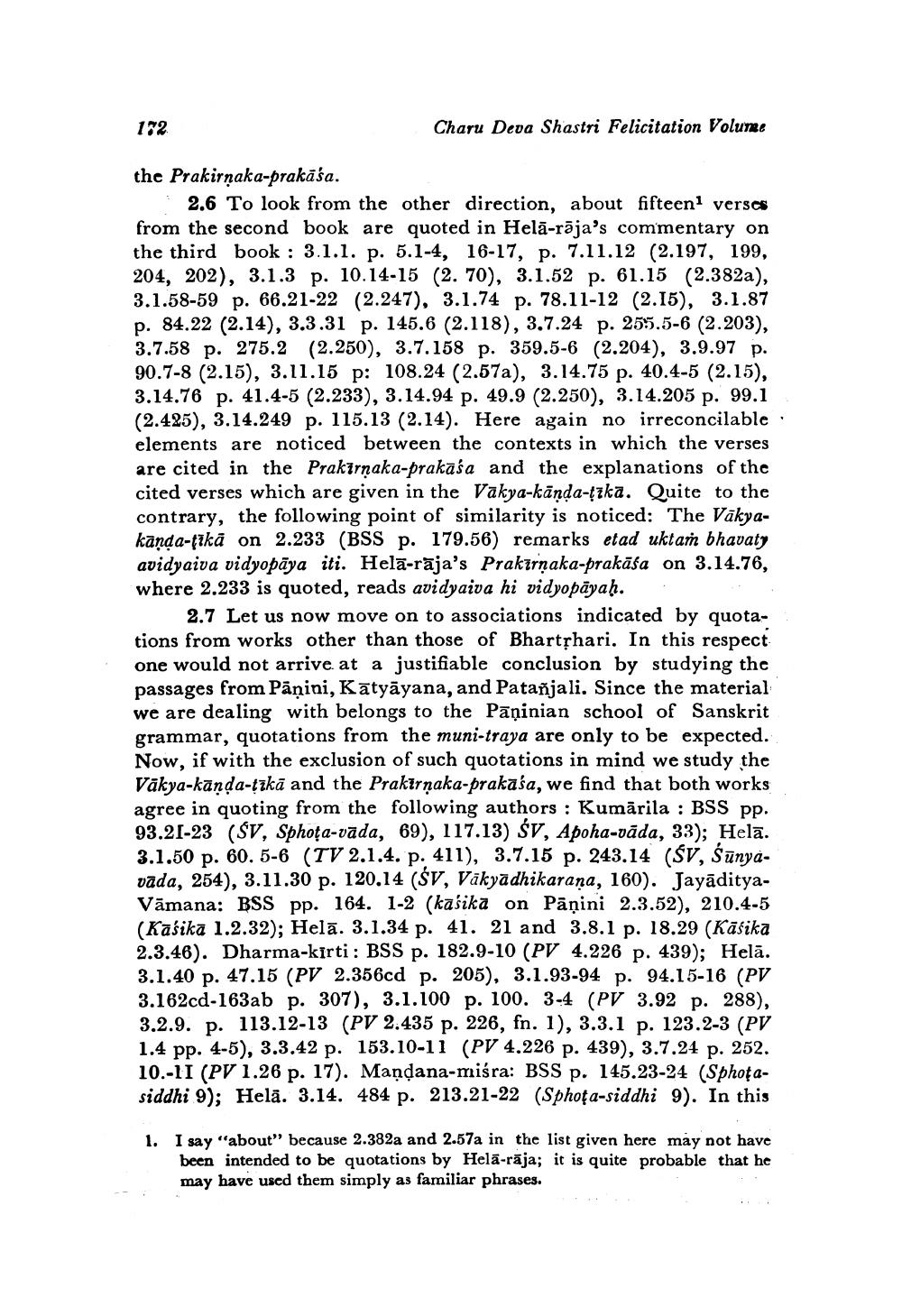Book Title: Authorship Of Vakya Kanda Tika Author(s): Ashok Aklujkar Publisher: Ashok Aklujkar View full book textPage 8
________________ 172 Charu Deva Shastri Felicitation Volume the Prakirnaka-prakāśa. 2.6 To look from the other direction, about fifteen1 verses from the second book are quoted in Helā-rāja's commentary on the third book : 3.1.1. p. 5.1-4, 16-17, p. 7.11.12 (2.197, 199, 204, 202), 3.1.3 p. 10.14-15 (2. 70), 3.1.52 p. 61.15 (2.382a), 3.1.58-59 p. 66.21-22 (2.247), 3.1.74 p. 78.11-12 (2.15), 3.1.87 p. 84.22 (2.14), 3.3.31 p. 145.6 (2.118), 3.7.24 p. 255.5-6 (2.203), 3.7.58 p. 275.2 (2.250), 3.7.158 p. 359.5-6 (2.204), 3.9.97 p. 90.7-8 (2.15), 3.11.15 p: 108.24 (2.57a), 3.14.75 p. 40.4-5 (2.15), 3.14.76 p. 41.4-5 (2.233), 3.14.94 p. 49.9 (2.250), 3.14.205 p. 99.1 (2.425), 3.14.249 p. 115.13 (2.14). Here again no irreconcilable elements are noticed between the contexts in which the verses are cited in the Prakırnaka-prakasa and the explanations of the cited verses which are given in the Vakya-kānda-țzka. Quite to the contrary, the following point of similarity is noticed: The Vākyakānda-fikā on 2.233 (BSS p. 179.56) remarks etad uktam bhavaty avidyaiva vidyopāya iti. Helā-rāja's Prakırnaka-prakāśa on 3.14.76, where 2.233 is quoted, reads avidyaiva hi vidyopāyaḥ. ? 2.7 Let us now move on to associations indicated by quotations from works other than those of Bhartphari. In this respect one would not arrive at a justifiable conclusion by studying the passages from Pāņini, Kātyāyana, and Patañjali. Since the material we are dealing with belongs to the Pāṇinian school of Sanskrit grammar, quotations from the muni-traya are only to be expected. Now, if with the exclusion of such quotations in mind we study the Vakya-kānda-tīkā and the Prakirņaka-prakaśa, we find that both works agree in quoting from the following authors : Kumārila : BSS pp. 93.21-23 (SV, Sphoța-vāda, 69), 117.13) ŚV, Apoha-vāda, 33); Hela. 3.1.50 p. 60. 5-6 (TV 2.1.4. p. 411), 3.7.15 p. 243.14 (ŚV, Śūnyavada, 254), 3.11.30 p. 120.14 (ŚV, Vākyādhikarana, 160). JayādityaVāmana: BSS pp. 164. 1-2 (kašika on Pāṇini 2.3.52), 210.4-5 (Kašika 1.2.32); Helā. 3.1.34 p. 41. 21 and 3.8.1 p. 18.29 (Kāśika 2.3.46). Dharma-kirti: BSS p. 182.9-10 (PV 4.226 p. 439); Helā. 3.1.40 p. 47.15 (PV 2.356cd p. 205), 3.1.93-94 p. 94.15-16 (PV 3.162cd-163ab p. 307), 3.1.100 p. 100. 3-4 (PV 3.92 p. 288), 3.2.9. p. 113.12-13 (PV 2.435 p. 226, fn. 1), 3.3.1 p. 123.2-3 (PV 1.4 pp. 4-5), 3.3.42 p. 153.10-11 (PV 4.226 p. 439), 3.7.24 p. 252. 10.-1I (PV 1.26 p. 17). Mandana-misra: BSS p. 145.23-24 (Sphoțasiddhi 9); Helā. 3.14. 484 p. 213.21-22 (Sphoța-siddhi 9). In this a and the Prak wing authors : Kumas. 33); Helā. 1. I say "about" because 2.382a and 2.57a in the list given here may not have been intended to be quotations by Helā-rāja; it is quite probable that he may have used them simply as familiar phrases.Page Navigation
1 ... 6 7 8 9 10 11 12 13 14 15 16 17 18 19 20 21 22 23 24
